Oshosi - The Hunter
 Monday, November 21, 2016 at 3:56PM
Monday, November 21, 2016 at 3:56PM 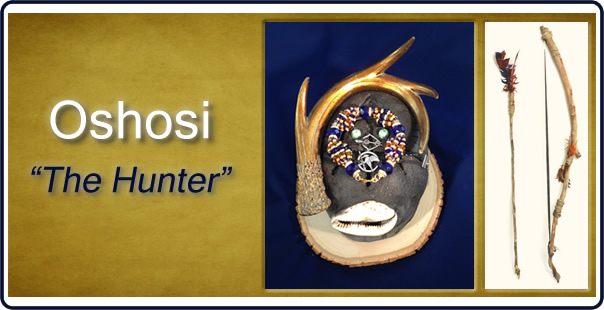
Learning about the Orishas:
In our continuing blog series of introductions to the Orishas, I would like to take a moment to stress the importance of learning about the mysteries of each Orisha as they all have so much to give if only we took the time to really learn about their energy and how to work with them. Traditionally, in the Yoruba culture, when a priest became initiated, they took on the role of learning and becoming the expert of that Orisha. A priest is initiated by crowing their guardian Orisha on their head which strengthen their affinity to the Orisha and are then able to explore the mysteries more easily. When people wanted help from an Orisha, they would usually go to the priest of that Orisha who would advise them and facilitate the connection to that Orisha. The objective of this blog series is to empower you to get to know each Orisha so that you can interact with them yourself. Keep in mind that these introductions only scratches the surface as there’s so much more to them.
You may have wondered why we turn to different Orishas for help when we have a guardian Orisha who resonates so closely with us. The answer is quite simply that sometimes what is required of us is not in our nature nor that of our guardian Orisha. Suppose that the problem you’re having requires you to be more aggressive in order to come to a resolution, but your introverted nature would prefer to avoid confrontation. Or if the opposite situation was true, let’s say that it requires a calm, patience and a methodical approach but you are just too impulsive to pull it off. This would be the time to seek help from an Orisha whose energy better resonates with what is needed.
As you explore and learn about the Orishas, you’ll come to the realization that their energy falls into two categories. On the one side of the spectrum you have the Orishas with cool energy, they include Obatala (Orisanla), Oshosi, Osain (Osanyin), Odùduwà, Yemoja, Olòkun, Oshun, Orunmila …, and they work by attraction and are serene, reflective, patient, nurturing and gentle. On the other side of the spectrum you have Orishas with hot energy and include Eshu, Ogun, Shango, Oyá, Shopona (Babalú-Ayé), Aggayú, Sigídí … they work by expansion and help overcome obstacles, they are passionate, creative, assertive, aggressive, excitable, and even temperamental. The Orishas complement each other beautifully to create a harmonious balance in our universe. There are many Orishas, but actually only a few Orishas are crown on someone’s head, while others are never crowned as they are too intense, however you can still work with them if you are careful and understand their nature (e.g. Sigídí, Shopona). Understanding cool/hot energy will help you select appropriate Ebbos (offerings) to complement their energy. Orishas within the hot spectrum would appreciate Ebbos that strengthen heat such as spicy food such as “atari pepper” or “peppercorn”, while those with cool energy would prefer Ebbos that have a cooling effect, such “shea butter” or strengthen attraction like “honey”. Regardless of which Orisha you’re working with, we are always trying to balance cool/heat energy with our Ebbos in order to restore harmony and maintain balance in our lives. Note that even a hot Orisha would appreciate a little cooling now and then, for example we sprinkle cool water on Eshu to calm things down and we use oil to reduce friction. And vice-versa, Orishas with cool energy sometimes need a little spice, but not too much. On a quick observation, you may also notice that when we make an Ebbo, we’re also lighting a candle and including a glass of cool water, so the spectrum of heat/cool is always represented.
I encourage you to explore the Orisha world, ask questions, have discussions, share your experiences, interact with the Orishas and see what works for you, there is always something to be learned. Ashe!
Oshosi (Oxóssi, Ochosi, Oshoosi)
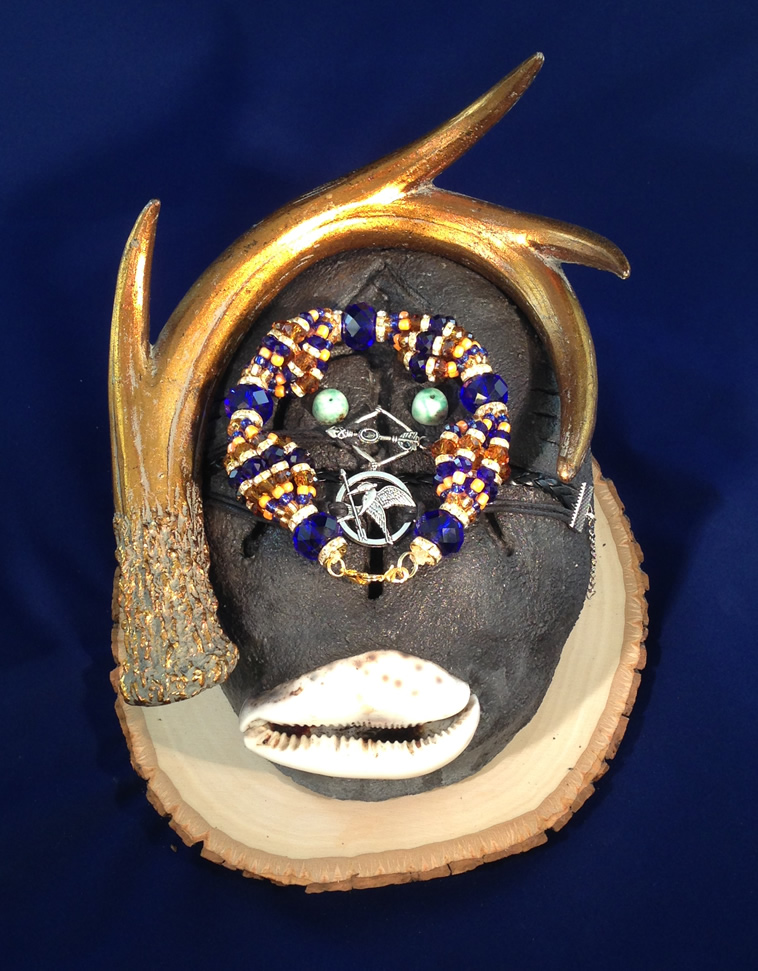 This blog article is dedicated to the Orisha Oshosi which I’m very fond of, a wonderfully unique and mysterious energy that is part of a ceremony called “The Warriors” (Spanish: “Gerreros”). It is the next step in the Ifa path after getting “Elekes” (necklaces) and a personal Eshu. The warriors consist of Ogún and Oshosi, note that Ogún is a hot energy and Oshosi is a cool energy. They complement each other and work together to enhance their effectiveness. In conjunction with Eshu, they are our primary spiritual tools that we as Ifa followers use to create harmony and navigate the path of our destinies, overcome obstacles that impede our progress, and gain knowledge and wisdom to attract prosperity, love, good health, joy and peace to our lives. Ogún and Oshosi usually share a three legged cauldron together which include various tools that they use. You could also have a personal Oshosi that’s outside the cauldron as I have (shown on the right). I gave my Oshosi a golden antler, color beads (blue/amber), one amulet of a “bow and arrow” and one of a “bird holding an arrow” (reference to Pataki), he sits on a piece of forest wood slice.
This blog article is dedicated to the Orisha Oshosi which I’m very fond of, a wonderfully unique and mysterious energy that is part of a ceremony called “The Warriors” (Spanish: “Gerreros”). It is the next step in the Ifa path after getting “Elekes” (necklaces) and a personal Eshu. The warriors consist of Ogún and Oshosi, note that Ogún is a hot energy and Oshosi is a cool energy. They complement each other and work together to enhance their effectiveness. In conjunction with Eshu, they are our primary spiritual tools that we as Ifa followers use to create harmony and navigate the path of our destinies, overcome obstacles that impede our progress, and gain knowledge and wisdom to attract prosperity, love, good health, joy and peace to our lives. Ogún and Oshosi usually share a three legged cauldron together which include various tools that they use. You could also have a personal Oshosi that’s outside the cauldron as I have (shown on the right). I gave my Oshosi a golden antler, color beads (blue/amber), one amulet of a “bow and arrow” and one of a “bird holding an arrow” (reference to Pataki), he sits on a piece of forest wood slice.
Note that you do not need to be an initiated priest to have the warriors, and one of them may also actually be your guardian Orisha as well. The warriors are a very important step in the Ifa faith as they will propel you forward in your destiny.
Oshosi is the spirit of the hunter, one that is skillful and crafty, patient and methodical in its approach, and swiftly lethal once the opportunity presents itself to strike. Solitary in nature, the ultimate survivalist who quietly camouflages himself to blend with nature. He is the magician/shaman and seer who understands nature and bends it to his will. His stealth approach to track, stalk and study his prey enables him to use the prey’s very own nature to his advantage. The quality traits of the ultimate hunter include independently living off nature by foraging, trapping, and hunting, weathering storms, being comfortable alone with oneself, and patiently waiting until the right moment to strike.
A good analogy to understand the nature of Oshosi as a warrior would be if there was an army, Oshosi would be the elite force that is sent out in a stealth mission for special operations, alike a sharp shooter, reconnaissance, or other covert mission. Or perhaps, the diplomat that goes out to negotiates a solution to protect your interests. He always works behind the scenes and is highly resourceful and aware, he is often invoked to scout an area to find the missing. Oshosi is highly ethical and known for his objectivity and are often called upon for help in legal matters such as lawsuits, and any other problems dealing with authority figures such as police, IRS, and government.
Oshosi defends and protects while still being gentle. For this reason, he is called to look after children, young people and the innocent to protect them from predators and bullies. Oshosi gently nudges the young people in the right direction, watches over them from a distance, and swiftly come to their aid when needed. Having a small charm or pendant of a “bow and arrow” (symbol for Oshosi) for protection will strengthen that bond.
Oshosi is sensitive to injustices and will bring justice to those that have been wronged. But I cautioned you that when asking Oshosi to intervene, that you are certain of what you’re asking as you may not always see the big picture or know about mitigating circumstances. The following Pataki (story) illustrates this lesson.
Pataki: (there many variations of this story, but they all convey the same principle)
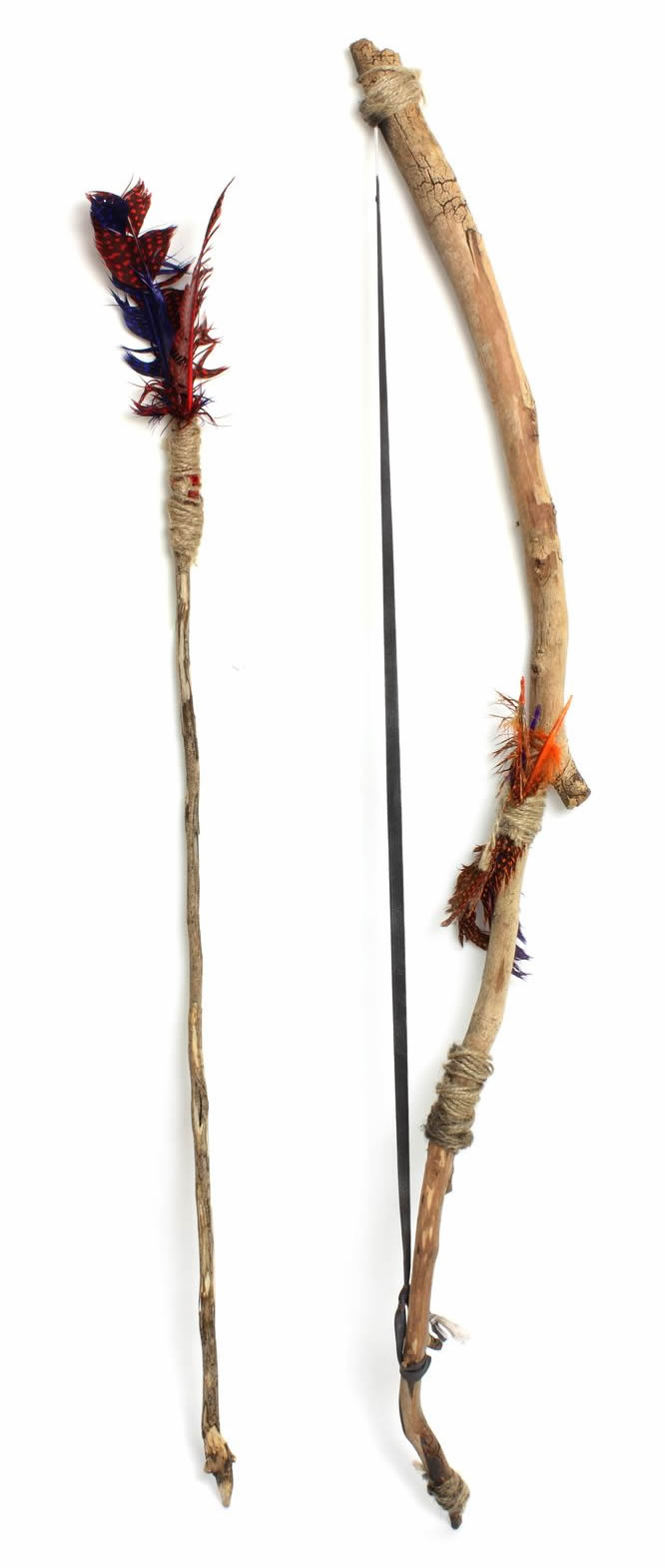 Oshosi was the most skillful hunter who lived on earth, it is said that Eshu (the divine messenger) brought a message to Oshosi from Orunmila to find and trap a very rare bird that Orunmila wanted to give to Olodumare. Oshosi being such a skillful tracker was able to find the rare bird and brought it home with him in a cage and went to rest from the long journey. During this time, Oshosi’s mother found the bird in the cage and thought Oshosi had caught it for dinner, so she proceeded to kill the bird, then went to the market to get spices to cook the bird. When Oshosi woke up, he found the dead bird and was furious that someone would have kill the rare bird. But he knew he had to act quickly and went back to the forest to look for another bird so as to not disappoint the Orishas. He searched and searched and fortunately was able to find another bird. Determined to not let it out of his sight this time, he went to see Eshu and told Eshu that he wanted to go see Orunmila in person and present the rare bird to Olodumare together, Eshu complied with Oshosi’s request. Olodumare was very pleased by Oshosi’s skills and determination, in response, Olodumare gave Oshosi a crown to make him an Orisha at that very moment. Olodumare asked Oshosi what he was going to do with his new powers, Oshosi without hesitation said “I want justice, I want to shoot an arrow into the air and pierce the heart of the one who killed the first bird he had caught”. Olodumare asked Oshosi if he was absolutely certain that’s what he wanted, as an Orisha you now have to the power to do so. Oshosi said yes and shot the arrow into the air. When Oshosi returned home he found his arrow had pierced the heart of his mother. Oshosi was very distraught of what he had done and recognized his own impetuousness and bowed to protect the innocent and find the truth from then on.
Oshosi was the most skillful hunter who lived on earth, it is said that Eshu (the divine messenger) brought a message to Oshosi from Orunmila to find and trap a very rare bird that Orunmila wanted to give to Olodumare. Oshosi being such a skillful tracker was able to find the rare bird and brought it home with him in a cage and went to rest from the long journey. During this time, Oshosi’s mother found the bird in the cage and thought Oshosi had caught it for dinner, so she proceeded to kill the bird, then went to the market to get spices to cook the bird. When Oshosi woke up, he found the dead bird and was furious that someone would have kill the rare bird. But he knew he had to act quickly and went back to the forest to look for another bird so as to not disappoint the Orishas. He searched and searched and fortunately was able to find another bird. Determined to not let it out of his sight this time, he went to see Eshu and told Eshu that he wanted to go see Orunmila in person and present the rare bird to Olodumare together, Eshu complied with Oshosi’s request. Olodumare was very pleased by Oshosi’s skills and determination, in response, Olodumare gave Oshosi a crown to make him an Orisha at that very moment. Olodumare asked Oshosi what he was going to do with his new powers, Oshosi without hesitation said “I want justice, I want to shoot an arrow into the air and pierce the heart of the one who killed the first bird he had caught”. Olodumare asked Oshosi if he was absolutely certain that’s what he wanted, as an Orisha you now have to the power to do so. Oshosi said yes and shot the arrow into the air. When Oshosi returned home he found his arrow had pierced the heart of his mother. Oshosi was very distraught of what he had done and recognized his own impetuousness and bowed to protect the innocent and find the truth from then on.
The motto of the story is that justice can be blind and without mercy, so always consider mitigating circumstances. You should always have compassion when applying justice.
Children of Oshosi:
The children of Oshosi are clever and highly resourceful. They gain wisdom by exploring and trying new things on their own. When they are in tune with their inner self, they demonstrate a gentle disposition and inner strength. They can be very ethical and would do well in careers involving law and order, or any work that requires objectivity, fairness and impartiality (e.g. referee). Any field that requires diplomacy, research or exploration would also be a good choice. Their independent nature could lead them into many fields of work.
Symbology:
The “deer” is one of the animals that embodies or personifies the energy of Oshosi because of its gentle demeanor and alertness. They camouflage and blend into their environment, quietly foraging and moving about during the twilight hours. Their senses are very acute, hearing a twig snap a long distance away, and having a keen sense of smell to detect predators up wind. Oshosi teaches us the power of a gentle approach to solving problems.
The “bow and arrow” is the main symbol for Oshosi, it reflects his precise and swift approach.
The “handcuffs” and “fishing hook” are sometimes use, especially if you work in law and order.
Ebbos:
The best time of day to make Ebbos (offerings) to Oshosi, is during the twilight hours of sunrise or sunset.
Colors: Dark blue and Amber or Gold, also Indigo.
Number: 3 and 7
The number 7 and dark blue color may be a reference to Yemoja whom he is closed to.
Celebration Day: October 25th
Foods:
- Trail mix (nuts and berries, dry fruits), wild honey
- All fresh fruit
- Yams, sweet potatoes
- Wild game cooked dishes (pheasant, quail)
Liquor: Anisette, rum
Oil
Cigars
Recommended link: Oshosi in Spiritual Tools
Love and Blessings! Javier Lujan {Babalawo Ifajuitan}


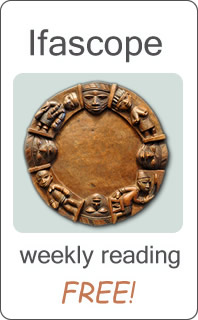
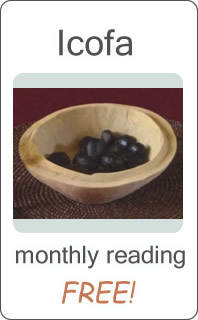
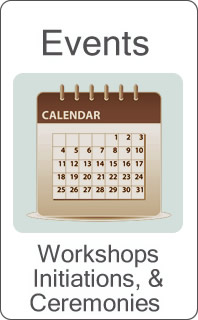
Reader Comments